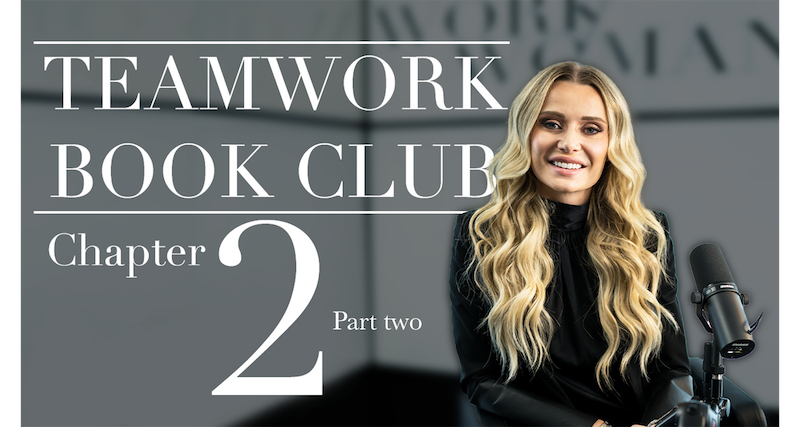Welcome back to our deep dive into mission statements!
Welcome to part two of our four-part series focusing on the importance of mission statements, inspired by chapter two of my bestselling book, TeamWork.
Even though TeamWork is only a year old, so much has changed since its publication, and while the stories, insights, and recommendations are still incredibly relevant to business owners and leaders who are devoted to creating great teams, I love having the opportunity to get even deeper on topics like mission statements.
Last time, we covered how mission statements can guide your business, no matter what the economic environment, especially if your business’s mission statement is clear and clearly communicated. But there’s so much more to it than that.
Let’s explore the how behind mission statements, and so much more. Let’s get into it!
Why simply creating a mission statement isn’t enough
Let me address the primary reason why mission statements don’t get the attention and respect they deserve.
It’s because people go through the effort of creating a mission statement, and either they create something that is unclear, irrelevant to their team or their customers, or, and this is probably what happens in most cases, they create a mission statement, share it once with their team, and then more or less abandon it altogether.
They might hang it on the wall. But are they really using it? I want the exercise of developing a mission statement at a Cardone Ventures event to not be the end goal, but for it to be the event that kick starts a revolution in your business. I’m not exaggerating. Your mission statement should inspire! It should be a reminder to you and your team every single day of why you’re doing what you’re doing.
Why am I doing this? What is the purpose of this task? What is the point of anything here? It should all be in your mission statement, and if your mission statement doesn’t answer those questions and motivate people, then it’s not the right mission statement.
And don’t for a second think that I don’t get caught up in the same day to day distractions that everyone else does. Like, we’re getting ready to travel, the house is a disaster, my inbox is overflowing — I’ve got other things on my mind, you know?
But these are those moments where, when I’m getting caught up in the stress and negativity, I catch myself and remember that I have the power to have a positive impact on people’s lives and businesses — their personal, professional, and financial goals — when I allow myself to be present and focus on the mission. It just resets everything.
I have a responsibility. I need to show up. I need to put my game face on. And I have to be committed.
This is precisely why you can’t just create a mission statement, but you also really have to live it through how you operate your business.
Your mission statement in practice
One of the things that I love about mission statements is that they keep you honest. On more than one occasion, I’ve found myself talking to business owners who, after going through the mission statement development process, still try to make every excuse in the world of why they can’t follow through on things that are central to their mission statement.
There’s no space in a mission statement for excuses. Here’s what I mean…
At Cardone Ventures, like I’ve mentioned before, our mission is to help our clients achieve their personal, professional, and financial goals. This means that we’re a growth mindset organization that works with other growth mindset organizations in order to help our collective achieve our goals.
This kind of growth mindset requires that the Cardone team always be at the top of their game, but I’d be lying if every once in a while I didn’t think, “Do I really need to do a daily team meeting?
But the fact of the matter is, if I’m really supporting our company’s growth mindset, and if I’m really supporting our teams in order to help them best support our clients, then, yes, we do really need a daily team meeting, and I need to be there to lead and to listen. And the mission is there to remind me of why I need to get over my own stuff and be present for the people who need me.
Your mission can also help you prioritize your focus
At Cardone, we’re always thinking about our short and long term initiatives, and as of this writing, we’ve just entered the fourth quarter of the year, which is when most companies are (or should be!) evaluating how they can reach their year-end goals while also focusing on annual planning for 2023.
Again, your mission can help you put this into focus. And, again, I’ll use Cardone Ventures as the example.
Our team travels a lot, and we have more opportunities to travel, network, meet business owners, and explore opportunities than there are days in a year. In other words, our time is limited, and we want to make sure that we’re focusing our investments on those events that are going to get us ever-closer to achieving our goals.
So using our mission at the North Star helps us remember to focus on those opportunities that are going to help us help our clients achieve their personal, professional, and financial goals.
Does this mean that we’ve had to pass on some pretty cool events and meetings? It sure has! But those events aren’t ever as cool or as important as the ones that create the most impact with our clients.
Being realistic, we see a certain amount of distraction with a lot of the business owners that we’ve encountered over the years, which is proof of either a lack of mission, or allowing things into their orbit that distract from the mission.
These are people we consider partners. We have a stake in their businesses. They have the best intentions of doing all the right things, but their approach to growing their team members is all over the place. The way they showcase their brand on social media is all over the place.
They have side businesses and random investments and other things that are taking their energy away from their core opportunity in their primary business, and that business is becoming a mess because they’re focused on what I would call personal things. It’s muddying their brand.
My advice here is to stop confusing the issue. You’ve not only confused your audience, but you’ve confused yourself. It’s time to realign with your mission. If the opportunity you’re considering is not tied directly to your business’s mission statement, then just say no. Seriously. Stay focused. Even if it sounds interesting, stay focused.
This is one of the many reasons why I have so much respect for Grant Cardone. He’s like, “I focus on multi-family properties. Not house flipping. Not crypto. Not the stock market. I commit to doing one thing, and I focus on being great at it.” That’s staying aligned with your North Star in a significant and impactful way.
It’s shocking how hard this can be for people sometimes. And I know that there’s gonna be other people that make money, possibly significant money, doing the thing you’ve said no to, but the point is that you made a commitment to this other thing, and you owe it to yourself, your team, and your clients to follow through without distraction.
If you allow yourself to get distracted, not only are you going to fall down at what was supposed to be your primary goal, but you’re probably going to get distracted by other distractions, too, which will only chip away at your self-confidence.
So, never forget, your mission is your guiding force. It will help you be self-disciplined. Don’t take it for granted.
Use your mission to redirect your team
Everyone has problems. This is probably not a shocking statement to you, but it’s important to reiterate this fact. Everyone does. You’ll have problems. So will your team members. This means that your business will, too.
Commonly, business owners tell me about how disengaged and unmotivated they find their employees to be, and that these same employees will want them to be their personal therapists, taking up valuable time just to talk about their problems.
On the one hand, this shows a level of comfort and intimacy that is valuable. On the other hand, it shows that this person has no idea why they’re at this organization.
Seriously, does a mission-focused person at a mission-focused organization typically think it’s appropriate to waste their manager’s time with personal tales of disengagement? I really don’t think so.
The problem here is that they’re been given so little insight into the mission of the organization, that there’s really nothing that you can redirect them to when they’ve gotten so far off target.
It’s a fine line, right? Like, when it comes to personal stuff, and you have a team member who is, inappropriately or not, being very vulnerable, then you’re supposed to handle these situations delicately, right? You’ve got to bring some level of sensitivity to the situation.
We’re human. And we should treat people accordingly. However, this is a place of business. It’s not a social club. It’s not gossip time. Frankly, it’s inappropriate, and to be perfectly honest it’s a complete and total waste of my time. And I really hate having my time wasted.
So when I see these situations happening, I have a stock question that I tend to put out there. And it’s all based on the mission.
I’ll say, “Hey, guys — Remind me what it is that we’re here to do?”
Sometimes, this question is met with blank stares. It kinda throws people off. So then I’ll ask people to repeat back to me what our mission statement is.
Now maybe this is a bit much for some, but the point is, what is happening right now at this moment is in no way, shape, or form in service of our mission. In fact, it’s in total defiance of it.
So let’s pause, reflect, and move on. It’s incredibly direct, but it’s also incredibly powerful. And it works.
The incredible thing is, this just scratches the surface of what mission statements can do for your organization. Next time, we’ll be exploring the power of mission statements even further, as we continue our TeamWork Book Club series!
Remember, if you haven’t already gotten your FREE copy of TeamWork, you can do so by going here and following the instructions.
And if you’re interested in having a real-life experience with me and the Cardone Ventures team, then you need to join us at our next live event! We’ll cover topics that impact every aspect of your business. These events sell out quickly, so register now to save your seat!

